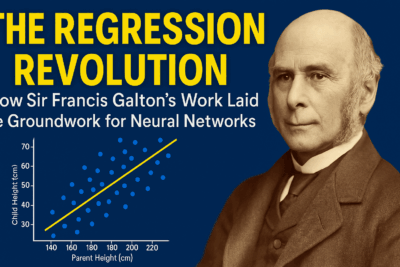Author: Bindeshwar Singh Kushwaha
Institute: PostNetwork Academy
Sir Francis Galton: Biography and Contributions
Quick Facts
- Name: Sir Francis Galton, FRS FRAI
- Born: 16 February 1822, Birmingham, England
- Died: 17 January 1911, Haslemere, Surrey, England (Aged 88)
- Resting Place: Claverdon, Warwickshire, England
- Education: King’s College London, Trinity College Cambridge
- Father: Samuel Tertius Galton
- Relatives: Charles Darwin (cousin), Erasmus Darwin (grandfather)
Galton’s Major Contributions
- Founder of Eugenics
- Pioneered Behavioural Genetics
- Introduced Regression Toward the Mean
- Introduced Standard Deviation Concept
- Discovered Anticyclones and Isochrone Maps
- Created the First Weather Maps
- Invented the Galton Board and Galton Distribution
- Developed the Galton–Watson Process
- Known for Galton’s Problem and Galton’s Whistle
Galton’s Career and Recognition
- Fields: Anthropology, Sociology, Psychology, Statistics
- Institutions: Meteorological Council, Royal Geographical Society
- Academic Advisor: William Hopkins
- Notable Student: Karl Pearson
- Awards:
- Royal Geographical Society’s Founder’s Medal (1853)
- Royal Medal (1886)
- Huxley Memorial Medal (1901)
- Darwin–Wallace Medal (1908)
- Knight Bachelor (1909)
- Copley Medal (1910)
Galton’s Work on Regression Analysis
- Sir Francis Galton introduced the concept of Regression Toward the Mean while studying the relationship between parents’ and children’s heights.
- He observed that tall parents tend to have children who are shorter than them, and short parents tend to have children who are taller than them.
- This phenomenon was named regression, meaning a natural tendency for extreme characteristics to move closer to the average in subsequent generations.
- Galton’s discovery laid the foundation for modern regression analysis, which helps us predict and model relationships between variables.
Mathematical Representation of Regression:
$$ y = \alpha + \beta x + \epsilon $$
What If Galton Had Not Invented Regression?
- Without Galton’s discovery, modern regression analysis would have been delayed significantly.
- The development of machine learning algorithms that rely on regression models might have evolved much later.
- Key areas like econometrics, biostatistics, and psychometrics would lack powerful prediction tools.
- Deep learning foundations that trace back to statistical regression would have been fundamentally different or postponed.
- Predictive modeling in healthcare, finance, and weather forecasting would have suffered slow progress.
- The synergy between correlation and regression may not have been formally established early on.
Summary
- Sir Francis Galton was a brilliant but complex figure.
- He revolutionized fields like statistics, psychology, and meteorology.
- His ideas on eugenics remain highly controversial and ethically condemned today.
- His legacy continues in modern data science, fingerprinting, and weather forecasting.
Video
Reach PostNetwork Academy
- Website: www.postnetwork.co
- YouTube Channel: www.youtube.com/@postnetworkacademy
- Facebook Page: www.facebook.com/postnetworkacademy
- LinkedIn Page: www.linkedin.com/company/postnetworkacademy
- GitHub Repositories: www.github.com/postnetworkacademy
